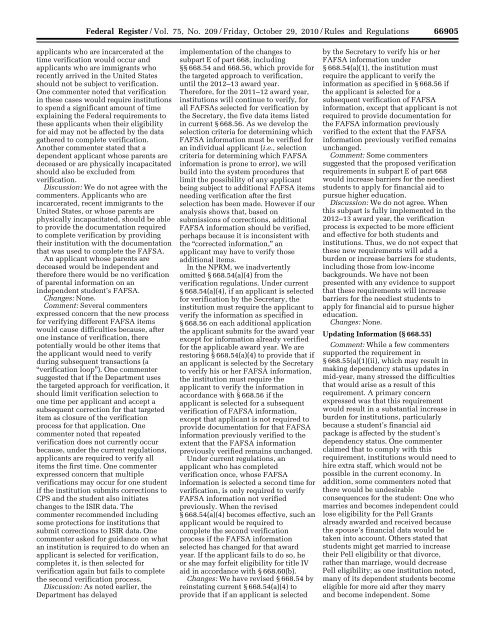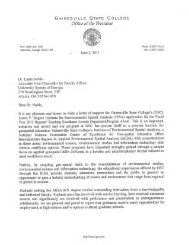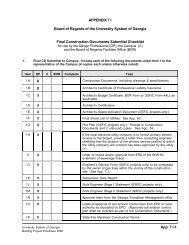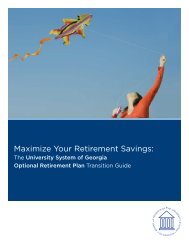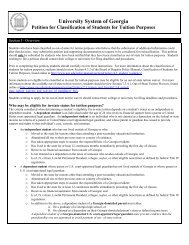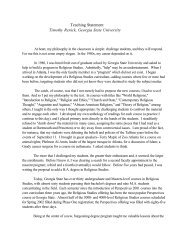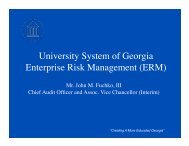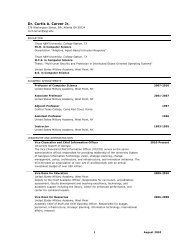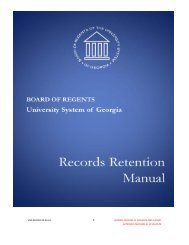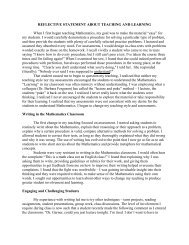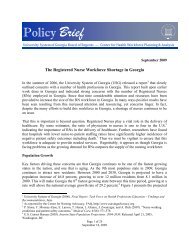WReier-Aviles on DSKGBLS3C1PROD with RULES266904 Federal Register / Vol. 75, No. 209 / Friday, October 29, 2010 / Rules and RegulationsDiscussion: Under these finalregulations, an institution must verifythe items selected for verification beforemaking any pr<strong>of</strong>essional judgmentadjustments regardless <strong>of</strong> whether aninstitution is making adjustments to theitem being verified. Prior to the effectivedate for subpart E <strong>of</strong> part 668 <strong>of</strong> thesefinal regulations, for an applicationselected for verification, an institutionmust verify the data elements identifiedin current § 668.56 before making anyadjustments regardless <strong>of</strong> whether aninstitution is making adjustments to theitem being verified.Changes: None.Comment: One commenter askedwhether an institution must completeverification prior to exercisingpr<strong>of</strong>essional judgment if the applicant’sFAFSA information is selected forverification by the institution, ratherthan by the Secretary.Discussion: To ensure that anypr<strong>of</strong>essional judgment adjustmentsmade by an institution are based onaccurate information, we believe that allFAFSA information selected forverification, whether selected by theSecretary or the institution, must beverified before the institution canexercise pr<strong>of</strong>essional judgment. We aremaking a change to § 668.53(c) to makethis clearer.Changes: We have revised § 668.53(c)by removing the phrase ‘‘by theSecretary’’ after the words ‘‘selected forverification’’ to provide that verification,regardless <strong>of</strong> whether the FAFSAinformation to be verified is selected bythe Secretary or the institution, must becompleted prior to exercisingpr<strong>of</strong>essional judgment.Selection <strong>of</strong> FAFSA Information forVerification (§ 668.54)Comment: Many commenterssupported our proposal to targetverification to those items reported onthe FAFSA that are most prone to error,based on a set <strong>of</strong> criteria that identifieswhich items are most likely to containerroneous data, instead <strong>of</strong> requiringverification <strong>of</strong> all five items listed incurrent § 668.56 for FAFSAs selected forverification.Another commenter agreed withproposed § 668.54(b)(1)(iii), whichexcludes from verification applicantswho only receive unsubsidized studentfinancial assistance. This commenterstated that this approach would be moreefficient for applicants and free up timefor institutional staff to help otherapplicants.Discussion: The <strong>Department</strong>appreciates the commenters’ support.Changes: None.Comment: Many commenters opposedremoving the institutional option tolimit the total number <strong>of</strong> applicants whomust be verified to 30 percent <strong>of</strong> allapplicants. They argued that removingthis limitation, which is reflected incurrent § 668.54(a)(2)(ii), would increasethe workload <strong>of</strong> FAAs already strugglingwith reductions in staff and in Statebudgets, with a multitude <strong>of</strong> regulatorychanges, and with increasedenrollments. Some commenters notedthat the <strong>Department</strong> currently targetsPell-eligible applicants for verificationand were concerned that communitycolleges would be unduly impacted ifthe 30 percent limitation were removed.Commenters stated that moreinstitutions may need to use the 30percent limit to manage their workloaddue to the large increase in applicantsapplying to institutions with openenrollment. Many commentersexpressed concern that the <strong>Department</strong>would significantly increase the number<strong>of</strong> applicants whose FAFSAs areselected for verification if a limit is notestablished in the regulations.One commenter noted that additionalstudy <strong>of</strong> the current verification processis needed to determine whichcorrections provide the most meaningfulimprovements in program integrity.A commenter recommended that weretain the 30 percent limit for at leasttwo years, during which time we canmonitor whether the proposed approach<strong>of</strong> targeting information to be verified,as reflected in § 668.56, actually reducesan institution’s burden. If, after this twoyearperiod, we have evidence to showthat burden on institutions has beenreduced, the commenter suggested thatthe limit on the percentage <strong>of</strong> applicantswhose FAFSAs must be verified shouldbe lifted or modified.Discussion: The <strong>Department</strong> reviews,studies, and analyzes verification dataon an ongoing basis. Annually, the<strong>Department</strong> develops a comprehensivepredictive model by applyingsophisticated statistical techniques toFAFSA application data from the mostrecent application filing years alongwith corresponding payment data fromthose same years. The model is designedto identify the characteristics <strong>of</strong> FAFSAapplications containing information thatis likely to have errors which, if notcorrected, will result in an improperpayment <strong>of</strong> title IV, HEA program funds.The model contains a series <strong>of</strong>application groupings that identifiesthat application’s statistical likelihood<strong>of</strong> error. The <strong>Department</strong> selectsapplications with the highest likelihood<strong>of</strong> significant error for verification.We are confident that, when fullyimplemented, the targeted selection <strong>of</strong>VerDate Mar2010 14:10 Oct 28, 2010 Jkt 223001 PO 00000 Frm 00074 Fmt 4701 Sfmt 4700 E:\FR\FM\29OCR2.SGM 29OCR2FAFSA information to be verified willresult in a more efficient and effectiveverification process. While someinstitutions, particularly those thatenroll greater numbers <strong>of</strong> Pell Grantapplicants, have more applicants whoseFAFSA information is selected forverification, we believe that overallburden will be reduced acrossinstitutions. This is because for eachapplicant whose FAFSA information isselected, the items to be verified will belimited to specific items the Secretaryhas selected for that applicant (seeproposed § 668.56(b)) rather than all fiveitems listed in current § 668.56. Forexample, one applicant may be requiredto verify the five items required underthe current regulations (because theSecretary includes them in the FederalRegister notice published under§ 668.56(a) and specifies that thoseitems must be verified for that oneapplicant) while another applicant mayonly be required to verify adjusted grossincome (AGI) and household size(because the Secretary includes thesetwo items in the Federal Register noticepublished under § 668.56(a) andspecifies that these are the only itemsthat must be verified for this applicant).The <strong>Department</strong> also notes that it doesnot view the 30 percent limitation asapplying to its own enforcement andmonitoring activities, including programreviews and audits.Changes: None.Comment: Some commenters askedthe <strong>Department</strong> to clarify how subpart E<strong>of</strong> part 668 will affect institutions thatare currently allowed to establish theirown verification criteria under theQuality Assurance (QA) Program.Discussion: The changes made to theverification regulations in subpart E <strong>of</strong>part 668 will not diminish theimportance <strong>of</strong> the QA Program. In fact,we are currently in the process <strong>of</strong>developing a plan to expand the number<strong>of</strong> institutions that participate in the QAProgram. We are especially interested inincreasing the participation <strong>of</strong> minorityserving institutions, communitycolleges, proprietary institutions, andinstitutions that serve non-traditionalstudents or that <strong>of</strong>fer instruction in nontraditionalways. Also, the changesmade to the verification regulations arenot expected to alter the way the QAProgram operates. In fact, the<strong>Department</strong> expects that data andresults generated from institutionsparticipating in the QA Program willhelp us assess the effectiveness <strong>of</strong> thenew verification regulations in subpartE <strong>of</strong> part 668.Changes: None.Comment: Two commenters statedthat the FAFSA information <strong>of</strong>
Federal Register / Vol. 75, No. 209 / Friday, October 29, 2010 / Rules and Regulations66905WReier-Aviles on DSKGBLS3C1PROD with RULES2applicants who are incarcerated at thetime verification would occur andapplicants who are immigrants whorecently arrived in the United Statesshould not be subject to verification.One commenter noted that verificationin these cases would require institutionsto spend a significant amount <strong>of</strong> timeexplaining the Federal requirements tothese applicants when their eligibilityfor aid may not be affected by the datagathered to complete verification.Another commenter stated that adependent applicant whose parents aredeceased or are physically incapacitatedshould also be excluded fromverification.Discussion: We do not agree with thecommenters. Applicants who areincarcerated, recent immigrants to theUnited States, or whose parents arephysically incapacitated, should be ableto provide the documentation requiredto complete verification by providingtheir institution with the documentationthat was used to complete the FAFSA.An applicant whose parents aredeceased would be independent andtherefore there would be no verification<strong>of</strong> parental information on anindependent student’s FAFSA.Changes: None.Comment: Several commentersexpressed concern that the new processfor verifying different FAFSA itemswould cause difficulties because, afterone instance <strong>of</strong> verification, therepotentially would be other items thatthe applicant would need to verifyduring subsequent transactions (a‘‘verification loop’’). One commentersuggested that if the <strong>Department</strong> usesthe targeted approach for verification, itshould limit verification selection toone time per applicant and accept asubsequent correction for that targeteditem as closure <strong>of</strong> the verificationprocess for that application. Onecommenter noted that repeatedverification does not currently occurbecause, under the current regulations,applicants are required to verify allitems the first time. One commenterexpressed concern that multipleverifications may occur for one studentif the institution submits corrections toCPS and the student also initiateschanges to the ISIR data. Thecommenter recommended includingsome protections for institutions thatsubmit corrections to ISIR data. Onecommenter asked for guidance on whatan institution is required to do when anapplicant is selected for verification,completes it, is then selected forverification again but fails to completethe second verification process.Discussion: As noted earlier, the<strong>Department</strong> has delayedimplementation <strong>of</strong> the changes tosubpart E <strong>of</strong> part 668, including§§ 668.54 and 668.56, which provide forthe targeted approach to verification,until the 2012–13 award year.Therefore, for the 2011–12 award year,institutions will continue to verify, forall FAFSAs selected for verification bythe Secretary, the five data items listedin current § 668.56. As we develop theselection criteria for determining whichFAFSA information must be verified foran individual applicant (i.e., selectioncriteria for determining which FAFSAinformation is prone to error), we willbuild into the system procedures thatlimit the possibility <strong>of</strong> any applicantbeing subject to additional FAFSA itemsneeding verification after the firstselection has been made. However if ouranalysis shows that, based onsubmissions <strong>of</strong> corrections, additionalFAFSA information should be verified,perhaps because it is inconsistent withthe ‘‘corrected information,’’ anapplicant may have to verify thoseadditional items.In the NPRM, we inadvertentlyomitted § 668.54(a)(4) from theverification regulations. Under current§ 668.54(a)(4), if an applicant is selectedfor verification by the Secretary, theinstitution must require the applicant toverify the information as specified in§ 668.56 on each additional applicationthe applicant submits for the award yearexcept for information already verifiedfor the applicable award year. We arerestoring § 668.54(a)(4) to provide that ifan applicant is selected by the Secretaryto verify his or her FAFSA information,the institution must require theapplicant to verify the information inaccordance with § 668.56 if theapplicant is selected for a subsequentverification <strong>of</strong> FAFSA information,except that applicant is not required toprovide documentation for that FAFSAinformation previously verified to theextent that the FAFSA informationpreviously verified remains unchanged.Under current regulations, anapplicant who has completedverification once, whose FAFSAinformation is selected a second time forverification, is only required to verifyFAFSA information not verifiedpreviously. When the revised§ 668.54(a)(4) becomes effective, such anapplicant would be required tocomplete the second verificationprocess if the FAFSA informationselected has changed for that awardyear. If the applicant fails to do so, heor she may forfeit eligibility for title IVaid in accordance with § 668.60(b).Changes: We have revised § 668.54 byreinstating current § 668.54(a)(4) toprovide that if an applicant is selectedVerDate Mar2010 14:10 Oct 28, 2010 Jkt 223001 PO 00000 Frm 00075 Fmt 4701 Sfmt 4700 E:\FR\FM\29OCR2.SGM 29OCR2by the Secretary to verify his or herFAFSA information under§ 668.54(a)(1), the institution mustrequire the applicant to verify theinformation as specified in § 668.56 ifthe applicant is selected for asubsequent verification <strong>of</strong> FAFSAinformation, except that applicant is notrequired to provide documentation forthe FAFSA information previouslyverified to the extent that the FAFSAinformation previously verified remainsunchanged.Comment: Some commenterssuggested that the proposed verificationrequirements in subpart E <strong>of</strong> part 668would increase barriers for the needieststudents to apply for financial aid topursue higher education.Discussion: We do not agree. Whenthis subpart is fully implemented in the2012–13 award year, the verificationprocess is expected to be more efficientand effective for both students andinstitutions. Thus, we do not expect thatthese new requirements will add aburden or increase barriers for students,including those from low-incomebackgrounds. We have not beenpresented with any evidence to supportthat these requirements will increasebarriers for the neediest students toapply for financial aid to pursue highereducation.Changes: None.Updating Information (§ 668.55)Comment: While a few commenterssupported the requirement in§ 668.55(a)(1)(ii), which may result inmaking dependency status updates inmid-year, many stressed the difficultiesthat would arise as a result <strong>of</strong> thisrequirement. A primary concernexpressed was that this requirementwould result in a substantial increase inburden for institutions, particularlybecause a student’s financial aidpackage is affected by the student’sdependency status. One commenterclaimed that to comply with thisrequirement, institutions would need tohire extra staff, which would not bepossible in the current economy. Inaddition, some commenters noted thatthere would be undesirableconsequences for the student: One whomarries and becomes independent couldlose eligibility for the Pell Grantsalready awarded and received becausethe spouse’s financial data would betaken into account. Others stated thatstudents might get married to increasetheir Pell eligibility or that divorce,rather than marriage, would decreasePell eligibility; as one institution noted,many <strong>of</strong> its dependent students becomeeligible for more aid after they marryand become independent. Some
- Page 1 and 2:
Friday,October 29, 2010Part IIDepar
- Page 3 and 4:
Federal Register / Vol. 75, No. 209
- Page 6 and 7:
66836 Federal Register / Vol. 75, N
- Page 8 and 9:
66838 Federal Register / Vol. 75, N
- Page 10 and 11:
WReier-Aviles on DSKGBLS3C1PROD wit
- Page 12 and 13:
66842 Federal Register / Vol. 75, N
- Page 14 and 15:
66844 Federal Register / Vol. 75, N
- Page 16 and 17:
WReier-Aviles on DSKGBLS3C1PROD wit
- Page 18 and 19:
66848 Federal Register / Vol. 75, N
- Page 20 and 21:
66850 Federal Register / Vol. 75, N
- Page 22 and 23:
WReier-Aviles on DSKGBLS3C1PROD wit
- Page 24 and 25: 66854 Federal Register / Vol. 75, N
- Page 26 and 27: WReier-Aviles on DSKGBLS3C1PROD wit
- Page 28 and 29: 66858 Federal Register / Vol. 75, N
- Page 30 and 31: 66860 Federal Register / Vol. 75, N
- Page 32 and 33: 66862 Federal Register / Vol. 75, N
- Page 34 and 35: 66864 Federal Register / Vol. 75, N
- Page 36 and 37: 66866 Federal Register / Vol. 75, N
- Page 38 and 39: WReier-Aviles on DSKGBLS3C1PROD wit
- Page 40 and 41: WReier-Aviles on DSKGBLS3C1PROD wit
- Page 42 and 43: 66872 Federal Register / Vol. 75, N
- Page 44 and 45: WReier-Aviles on DSKGBLS3C1PROD wit
- Page 46 and 47: WReier-Aviles on DSKGBLS3C1PROD wit
- Page 48 and 49: WReier-Aviles on DSKGBLS3C1PROD wit
- Page 50 and 51: 66880 Federal Register / Vol. 75, N
- Page 52 and 53: WReier-Aviles on DSKGBLS3C1PROD wit
- Page 54 and 55: 66884 Federal Register / Vol. 75, N
- Page 56 and 57: 66886 Federal Register / Vol. 75, N
- Page 58 and 59: WReier-Aviles on DSKGBLS3C1PROD wit
- Page 60 and 61: WReier-Aviles on DSKGBLS3C1PROD wit
- Page 62 and 63: WReier-Aviles on DSKGBLS3C1PROD wit
- Page 64 and 65: WReier-Aviles on DSKGBLS3C1PROD wit
- Page 66 and 67: WReier-Aviles on DSKGBLS3C1PROD wit
- Page 68 and 69: WReier-Aviles on DSKGBLS3C1PROD wit
- Page 70 and 71: WReier-Aviles on DSKGBLS3C1PROD wit
- Page 72 and 73: 66902 Federal Register / Vol. 75, N
- Page 76 and 77: WReier-Aviles on DSKGBLS3C1PROD wit
- Page 78 and 79: 66908 Federal Register / Vol. 75, N
- Page 80 and 81: WReier-Aviles on DSKGBLS3C1PROD wit
- Page 82 and 83: 66912 Federal Register / Vol. 75, N
- Page 84 and 85: WReier-Aviles on DSKGBLS3C1PROD wit
- Page 86 and 87: 66916 Federal Register / Vol. 75, N
- Page 88 and 89: WReier-Aviles on DSKGBLS3C1PROD wit
- Page 90 and 91: WReier-Aviles on DSKGBLS3C1PROD wit
- Page 92 and 93: WReier-Aviles on DSKGBLS3C1PROD wit
- Page 94 and 95: 66924 Federal Register / Vol. 75, N
- Page 96 and 97: WReier-Aviles on DSKGBLS3C1PROD wit
- Page 98 and 99: 66928 Federal Register / Vol. 75, N
- Page 100 and 101: WReier-Aviles on DSKGBLS3C1PROD wit
- Page 102 and 103: 66932 Federal Register / Vol. 75, N
- Page 104 and 105: WReier-Aviles on DSKGBLS3C1PROD wit
- Page 106 and 107: 66936 Federal Register / Vol. 75, N
- Page 108 and 109: 66938 Federal Register / Vol. 75, N
- Page 110 and 111: 66940 Federal Register / Vol. 75, N
- Page 112 and 113: 66942 Federal Register / Vol. 75, N
- Page 114 and 115: 66944 Federal Register / Vol. 75, N
- Page 116 and 117: 66946 Federal Register / Vol. 75, N
- Page 118 and 119: WReier-Aviles on DSKGBLS3C1PROD wit
- Page 120 and 121: WReier-Aviles on DSKGBLS3C1PROD wit
- Page 122 and 123: WReier-Aviles on DSKGBLS3C1PROD wit
- Page 124 and 125:
66954 Federal Register / Vol. 75, N
- Page 126 and 127:
WReier-Aviles on DSKGBLS3C1PROD wit
- Page 128 and 129:
66958 Federal Register / Vol. 75, N
- Page 130 and 131:
66960 Federal Register / Vol. 75, N
- Page 132 and 133:
WReier-Aviles on DSKGBLS3C1PROD wit
- Page 134 and 135:
WReier-Aviles on DSKGBLS3C1PROD wit
- Page 136 and 137:
WReier-Aviles on DSKGBLS3C1PROD wit
- Page 138 and 139:
66968 Federal Register / Vol. 75, N
- Page 140 and 141:
66970 Federal Register / Vol. 75, N
- Page 142 and 143:
66972 Federal Register / Vol. 75, N
- Page 144 and 145:
66974 Federal Register / Vol. 75, N


